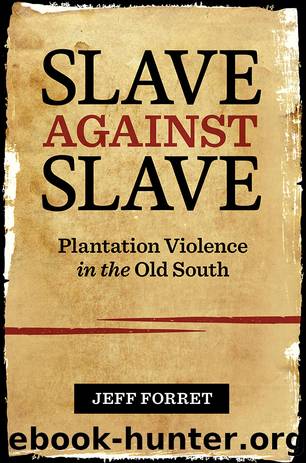Slave against Slave by Jeff Forret

Author:Jeff Forret [Forret, Jeff]
Language: eng
Format: epub
Tags: History, United States, State & Local, South (AL; AR; FL; GA; KY; LA; MS; NC; SC; TN; VA; WV), Social Science, Slavery
ISBN: 9780807161128
Google: R_UACwAAQBAJ
Publisher: LSU Press
Published: 2015-11-16T05:46:16+00:00
The broken relationships inside the quarters that incited such violence also held ramifications for southern slave law. Could enslaved husbands and wives, for instance, testify against the other in court? Whites embroiled in litigation could not be lawfully compelled to give evidence against a spouse. Did the same standard apply to slaves? â[T]he . . . question,â acknowledged one high court in the South, â. . . is one of great interest.â The Supreme Court of North Carolina established the precedent through which almost all southern states ruled the testimony of an enslaved spouse against his or her partner admissible evidence in the eyes of the law. Caswell County bondman Samuel had left his wife Mima but allegedly murdered the man who replaced him as her husband. During Samuelâs trial, Mima was called to testify against her former spouse of ten years and father of her five children. Samuelâs counsel objected, arguing that âcohabitation between slaves, constitutes, in this state, a marriage, or rather such a marriage as produces incompetency to give evidence.â Mutual consent of the parties involved, it was suggested, rather than formal recognition by the law, made the marital union. In its verdict from 1836, the North Carolina Supreme Court disagreed: âThe marriage of slaves in this State, consisting of cohabitation merely, by the permission of their owners, does not constitute the relation of husband and wife, so as to attach to them the privileges and disabilities, incident to that relation by the common law.â In assessing the competency of enslaved husbands and wives to testify against the other, Judge Thomas Ruffin explained that âonly a marriage de jure, will exclude one of the parties from giving evidence for or against the otherâ; âa marriage de facto will not.â In short, âthe only test of competency is this: are they in fact and in law husband and wife?â Legally, Mima was never Samuelâs wife, regardless of their decade as a couple. Eliminating all doubt as to Mimaâs ability to give evidence against Samuel, the Court also noted that her testimony âwould undoubtedly be admissible after they had separated, and she had become the wife of another slave.â Enslaved spouses could testify against the other under all circumstances, âeven in a capital case.â101
Nearly all other slaveholding states followed the precedent set in North Carolina. The Supreme Court of Alabama referenced the State v. Samuel decision in a similar case one decade later. In 1845, the Dallas County Circuit Court convicted the bondman Smith âfor the murder of one Edmund, also a slave.â During that trial, the state, in attempting to establish Smithâs jealousy toward Edmund, called Smithâs âown wife . . . as a witness against him.â Smithâs counsel argued, âAll the reasons which exclude the wife from being a witness for and against her husband, apply as well to slaves as free persons, and there is nothing in the condition of slavery which calls for the application of other than the general rules.â Prosecutors challenged this assertion.
Download
This site does not store any files on its server. We only index and link to content provided by other sites. Please contact the content providers to delete copyright contents if any and email us, we'll remove relevant links or contents immediately.
Cecilia; Or, Memoirs of an Heiress — Volume 1 by Fanny Burney(32533)
Cecilia; Or, Memoirs of an Heiress — Volume 2 by Fanny Burney(31931)
Cecilia; Or, Memoirs of an Heiress — Volume 3 by Fanny Burney(31923)
The Great Music City by Andrea Baker(31907)
We're Going to Need More Wine by Gabrielle Union(19028)
All the Missing Girls by Megan Miranda(15912)
Pimp by Iceberg Slim(14473)
Bombshells: Glamour Girls of a Lifetime by Sullivan Steve(14043)
For the Love of Europe by Rick Steves(13840)
Talking to Strangers by Malcolm Gladwell(13338)
Norse Mythology by Gaiman Neil(13325)
Fifty Shades Freed by E L James(13224)
Mindhunter: Inside the FBI's Elite Serial Crime Unit by John E. Douglas & Mark Olshaker(9307)
Crazy Rich Asians by Kevin Kwan(9268)
The Lost Art of Listening by Michael P. Nichols(7485)
Enlightenment Now: The Case for Reason, Science, Humanism, and Progress by Steven Pinker(7300)
The Four Agreements by Don Miguel Ruiz(6735)
Bad Blood by John Carreyrou(6606)
Weapons of Math Destruction by Cathy O'Neil(6253)
